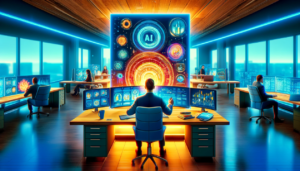AI Jobs Risk: ChatGPT’s Impact on the Workforce
Since its release in November 2022, ChatGPT has demonstrated the AI jobs risk, being used for various tasks such as writing cover letters, creating children’s books, and even assisting students in cheating on their essays. This widespread application of AI technology underscores the growing concern surrounding the AI jobs risk, particularly in white-collar roles.
As AI tools like ChatGPT become more sophisticated, they are increasingly capable of performing tasks traditionally reserved for human workers, raising questions about the future of employment in various sectors. Experts believe that these technologies could automate mid-career, mid-ability work, leading to a significant disruption in the job market.
This potential shift in the workforce landscape has prompted discussions about the need for re-skilling and up-skilling programs to prepare workers for the changing demands of the job market. Additionally, there is a growing emphasis on the importance of developing soft skills, such as creativity and emotional intelligence, which are less susceptible to automation. As we navigate this evolving landscape, it is crucial to address the AI jobs risk by fostering a workforce that is adaptable, resilient, and equipped to thrive in an increasingly automated world.
We strongly recommend that you check out our guide on how to take advantage of AI in today’s passive income economy.
Table of Contents
The AI Jobs Risk: Top 10 Roles at Risk
Business Insider has compiled a list of the top 10 jobs that are at the highest risk of being replaced by AI technologies. This list highlights the vulnerability of certain positions to the advancements in AI and the potential for significant changes in the workforce. As we delve into these roles, it’s crucial to understand the implications of AI jobs risk and how it might reshape our professional landscape.
1. Tech Jobs: Coders, Computer Programmers, Software Engineers, Data Analysts
In the tech industry, roles such as software developers, web developers, computer programmers, coders, and data scientists are particularly susceptible to AI jobs risk. ChatGPT and similar AI tools are proficient in crunching numbers and could potentially produce code faster than humans. This efficiency might lead to a reduction in the number of employees needed for certain tasks. While some believe that AI will enhance rather than replace jobs in coding and programming, the AI jobs risk remains a concern.
2. Media Jobs: Advertising, Content Creation, Technical Writing, Journalism
Media roles that involve content creation, such as advertising, technical writing, and journalism, are also facing AI jobs risk. AI’s ability to read, write, and understand text-based data makes these positions vulnerable to automation. However, the human judgment required in these occupations suggests that not all aspects of these jobs are automatable.
3. Legal Industry Jobs: Paralegals, Legal Assistants
Legal industry jobs, such as paralegals and legal assistants, are at risk due to AI’s proficiency in language-oriented tasks. These roles often involve consuming large amounts of information and synthesizing it into legal briefs or opinions. While AI can automate some aspects of these jobs, the need for human judgment in understanding client or employer needs means that these roles will not be fully automated.
4. Market Research Analysts
Market research analysts are responsible for collecting and analyzing data to design effective marketing campaigns. AI’s capability in analyzing data and predicting outcomes poses a risk to these roles. However, the human element in understanding and applying the insights from the data remains crucial.
5. Teachers
The education sector is not immune to AI jobs risk. Teachers are concerned about students using ChatGPT to cheat on homework, but there’s also the possibility that AI could take over some teaching responsibilities. While AI can assist in lesson planning and other tasks, the human connection in in-person instruction is irreplaceable.
6. Finance Jobs: Financial Analysts, Personal Financial Advisors
Financial roles that involve manipulating significant amounts of numerical data, such as financial analysts and personal financial advisors, are susceptible to AI-driven changes. AI’s ability to identify market trends and forecast investment mixes could automate parts of these jobs. However, the human expertise in understanding client needs and providing personalized advice remains essential.
7. Traders
In the finance sector, traders are at risk as AI technologies like ChatGPT can automate tasks such as Excel modeling, which is commonly done by entry-level employees at investment banks. The automation of these tasks could lead to a reduction in the number of people needed for certain roles.
8. Graphic Designers
The graphic design industry is facing AI jobs risk with the advent of AI tools like DALL-E, which can generate images in seconds. While these tools can enhance the ability to create and manipulate images, they also bring about economic challenges for those whose jobs are directly impacted.
9. Accountants
Accounting, traditionally seen as a stable profession, is not immune to AI jobs risk. The automation of intellectual labor, including tasks performed by accountants, is a growing concern. The impact of technology on employment and politics in this sector is an area of interest.
10. Customer Service Agents
Customer service roles are increasingly being automated with AI technologies like ChatGPT. A study predicted that chatbots would be the main customer service channel for roughly 25% of companies by 2027. This trend highlights the AI jobs risk in the customer service industry.
AI Jobs Risk: Best Tips for Navigating the Future
As we navigate the landscape of AI jobs risk, it’s essential to equip ourselves with strategies to thrive in an evolving job market. Here are some best tips to mitigate the risks and leverage the opportunities presented by AI:
- Embrace Lifelong Learning: Continuously update your skills and knowledge to stay relevant in your field. Engage in professional development opportunities, online courses, and workshops that focus on emerging technologies and AI-related skills.
- Cultivate Adaptability: Be open to change and willing to adapt to new roles and responsibilities. Flexibility in your career path can help you pivot to areas less susceptible to automation.
- Enhance Soft Skills: While AI can automate many technical tasks, soft skills such as creativity, empathy, and critical thinking remain uniquely human. Focus on developing these skills to complement the capabilities of AI.
- Stay Informed: Keep abreast of industry trends and the impact of AI on your sector. Understanding the potential changes can help you anticipate shifts and prepare accordingly.
- Collaborate with AI: Rather than viewing AI as a threat, consider how it can enhance your work. Explore ways to integrate AI tools into your workflow to improve efficiency and productivity.
- Focus on Problem-Solving: Cultivate the ability to solve complex problems, as this skill is highly valued and less likely to be automated. Use AI as a tool to aid in your problem-solving process.
- Network and Build Relationships: Build a strong professional network and foster relationships within your industry. Human connections can provide support, opportunities, and insights that AI cannot replicate.
- Specialize in AI Ethics and Governance: As AI becomes more prevalent, there will be a growing demand for professionals who can navigate the ethical and regulatory aspects of AI. Consider specializing in this area to position yourself as a valuable asset.
- Seek Interdisciplinary Experiences: Combine your expertise with knowledge from other fields to create a unique skill set that is less susceptible to automation. Interdisciplinary skills can open up new career opportunities.
- Stay Positive and Proactive: Approach the AI jobs risk with a positive mindset and take proactive steps to future-proof your career. Embrace the opportunities AI presents and use them to your advantage.
By implementing these tips, you can navigate the AI jobs risk with confidence and position yourself for success in the rapidly evolving job market.
Conclusion: Navigating the AI Jobs Risk
As we witness the rise of AI technologies like ChatGPT, it’s clear that the AI jobs risk is a pressing issue across various industries, raising concerns about job security and employment opportunities. From tech roles to creative professions, the potential for automation is reshaping the job market, with AI applications becoming increasingly sophisticated and capable of performing tasks traditionally done by humans.
While AI can enhance productivity and efficiency, leading to cost savings and increased output, it’s crucial to consider the human element and ensure that these technologies are used as tools to augment rather than replace jobs. This requires a careful balance between embracing technological advancements and preserving the unique value of human expertise, creativity, and empathy in the workforce.
As we move forward, a balanced approach that leverages the strengths of AI while preserving the value of human expertise will be essential in navigating the AI jobs risk. Policymakers, educators, and industry leaders must work together to develop strategies that address the challenges and opportunities presented by AI, ensuring that the workforce is equipped with the skills and knowledge needed to thrive in an increasingly automated world.

We strongly recommend that you check out our guide on how to take advantage of AI in today’s passive income economy.




